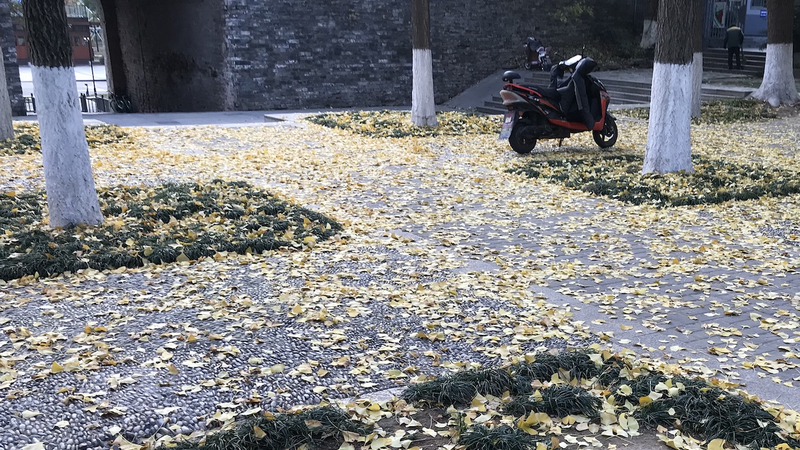As I walked out of the Hesburgh library, the wind blew softly to my face as it was whispering to me. The wind from the north rolled up the golden leaves from the ground, which looked like children tumbling in the water. When I watched the leaves dancing in the air, I noticed that it was the exact type of leaves I used to see in the fall in China. Back at home, we called this type of tree “Wutong.” In the autumn season, Wutong drop their leaves, and the wide yellow leaves fall from high branches, expressing loneliness and sorrow. Many ancient Chinese poets described Wutong as the symbol of parting from the one you love and the fallen leaves signified great solitude. I remember when the season changed and the leaves fell, my father and I would play a game called “fighting leaves” by tying the stems of two leaves together and competing over which leaf’s stalk was stronger. We pulled them in different directions like “tug of war.” I used to spend much time picking up “lucky” leaves and got ticked off every time my father’s leaf tore mine up.
However, I am 7000 miles from home currently and cannot go back home for all kinds of reasons for at least one year. Some curly spinning leaves brushed my shoes, the rustling sounds brought me back to reality. Yes, autumn is coming. After the sound of cicadas chirping stops and before the snow falls swirling on the ground, autumn arrives with withered leaves, foraging squirrels and growing darkness at night. Suddenly, homesickness almost overwhelms me. The changing season also indicates that living so far away from home is a new season in my life.
When I first arrived at Notre Dame, I did not feel sad or lonely. At a new place with similar weather to home, I felt excited about meeting new friends and knowing different locations. As a result, my mom always complained to me about how infrequently I called them. However, as time passed by, I suddenly felt everything to me was so alienated. I sometimes felt that I was still in China, and many moments proved that. I remember when I was on my way to my accounting class and in a hurry to the classroom, someone held the door for me. And, without hesitation, I just blurt out the word “Xiexie,” which means “thank you” in Chinese. Of course, she did not understand what I was saying, and I realized everything was different and apologized at once. On another day, I was walking towards the Hesburgh library when a bike passed me quickly. I recognized the person on the bike as one of my old friends and almost shouted out his name. But I could not remember his name anymore, and my memories just faded away from me at that moment. Definitely, my old friend did not even go to school in the US, and all these moments echoed in my memory.
There are other things that remind me of my life back home. Very often, food is a major trigger that awakens my memory of the special family dishes. When I first tasted the orange chicken in the dining hall, I found the familiar taste. It was juicy, tangy, sweet and salty. I love to mix the chicken’s sauce with white rice and use my tongue to feel the change in its flavor. The cold cucumber is also the exact same taste at home. I used to make this dish myself back home. With peeled cucumber, sugar, and a bit of vinegar mixed together, the dish can be made within five minutes. But my mom has a secret recipe for this mixture by adding to it a special cooking wine, a yellow wine brewed with a low alcohol of less than 15%, which cannot be found in the US supermarket.
Another dish that prompts my nostalgia is the hot pot from Ichiban. When the weather gets cold, the hot pot must be the most welcomed dish in China. The history of hot pot is about 2000 years old, and it signifies reunion in Chinese culture, for various staples are stewed in the same pot to create a joint flavor. For me, the meaning of hot pot is probably the taste of winter. I lived in the south part of China, without heating in the winter. Sitting in the house, even if the stove is on one side, I still feel cold and cannot brace myself. But if you have some friends or relatives sitting around, a hot pot is always the best way to drive away the chill, liven the atmosphere and warm up body and soul. All these make me recall my life in China, and everything seems so close to my eye but so hard to catch.
Occasionally in my dream, I found myself back in the old land with roaring roads, murmuring rivers, and the door that always opens to home. Just as Oliver Wendell Holmes wrote, “Where we love is home, home that our feet may leave, but not our hearts.” When the wind blows, leaves fall, seasons change, I know that my life has arrived at another new start. But life never stays on one point, and I should be ready to take future challenges and embrace those changes, with my heart bound in home.
Discussion Questions
- The author describes the experience of homesickness, a feeling that most people have experienced at one time or another. In what ways can you relate to the author’s experience of homesickness? On the other hand, what descriptions, images, or reflections does the author include that make her recounting of homesickness unique
- What images and sensory descriptions (those relating to sight, sound, smell, taste, or touch) are especially evocative? What feelings do they evoke for you?

